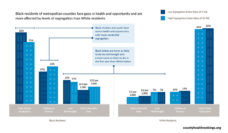Public Health Post: During the Affordable Care Act’s development, you were an adviser to President Obama and the Department of Health and Human Services (HHS). How would you compare the debate around health reform then to what we see now as we approach the 2020 election?
Neera Tanden: I think one of the reasons why the ACA passed is because of the rich, robust debate in the 2008 election. John McCain had a plan to extend coverage and Barack Obama had a plan to get to near-universal, but they fundamentally agreed on expanding coverage. So immediately after the election, there was a sense that the ground had been laid for success.
Now, we’re having an interesting debate in the Democratic Party about what version of expansion we should have–whether it’s building on the ACA or transforming the system through single payer, Medicare-for-All. And then on the Republican side, President Trump’s position is still to get rid of the ACA without a replacement plan in place. There is a much deeper contrast, certainly more than in 2008.
How did your time at HHS shape your priorities as you started working with the Center for American Progress (CAP)?
The Center for American Progress has strong experience in healthcare and in 2005, put forward an initial framework for what became the ACA. So, I certainly felt kinship there. After joining CAP, our major priorities have been ensuring strong implementation, defending it from attacks, and in recent years, fighting outright repeal attempts. Even without me, CAP probably would have done that, but I think my expertise has shaped those efforts.
As we mark the 400 years since the first slaves were sold in Jamestown, Virginia, which policies are needed to respond to the legacy of slavery that impacts the health of Black Americans?
We need to start with better enforcement of civil rights laws we already have, but we also need to dig deeper. The racial wealth gap, for example, is the product of generations of racism starting from slavery.
When we design “universal” proposals, we have to think about how the laws will actually be applied. For example, think about childcare. Universal, quality childcare would help everyone, but it could also meaningfully address racial and economic disparities. In our country, African American and Latino families have disproportionately fewer assets or resources for their infants and babies. A well-designed proposal ensures these families benefit the most; otherwise, we risk current inequalities exacerbating future inequalities.
What advice would you offer to the next generation of public health professionals looking to advance positive change?
Public health advocates and medical professionals have the ability to profoundly improve an individual’s life. But together, I think they also have an incredible voice for the most marginalized communities in our society. From personal experience, I have seen how vital doctors and nurses were in both passing and defending the ACA. For that reason, I hope the next generation thinks more broadly of the structures and policies in our country that contribute to disparities. I hope they use that collective voice to improve health outcomes for all.
In this increasingly divisive political climate, how do you stay hopeful?
Today, we are having profound, fundamental debates about who’s an American: do we welcome immigrants or repudiate them? Because the two parties diverge so significantly, it feels like our country is staring into the abyss. But I’m hopeful because we have been here before. We’ve pulled back and become stronger–we saw that possibility in last year’s midterm elections and in the campaign to save the ACA. It can happen again. In this moment, with our democracy now under its deepest assault, many have recognized the importance of protecting and defending it. And that is the moment we will be in until at least November 2020.
Photo courtesy of Neera Tanden














